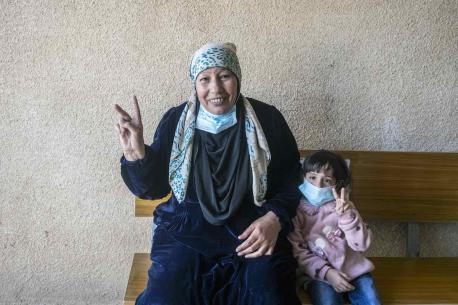
UNICEF Helps Refugees Get Their Fair Shot at COVID-19 Vaccines
Refugees' rights to health care travel with them wherever they go. UNICEF is on the ground to protect them every step of the way.
Aesha, a 62-year-old refugee from Syria, wasn't at all hesitant about lining up for her COVID-19 vaccination after shipments began arriving in Jordan in March through the COVAX facility. Two more shipments were delivered in April and May.
"Me? I know better," says the grandmother of 21, flashing the 'V for Vaccinated' sign in the photo above, while sitting with her granddaughter after receiving her COVID-19 vaccine in Za'atari refugee camp. "The vaccine is protection for us all and I am a woman of faith. I am here today to encourage others to take the vaccine. I am very grateful.”
In Jordan, refugees are eligible for vaccination along with Jordanians and those of other nationalities. To support Jordan's COVID-19 vaccination campaign, UNICEF is providing procurement and logistical support for vaccine delivery and has donated 1.3 million syringes.
UNICEF is helping Jordan's Ministry of Health reach all those eligible for COVID-19 vaccines, including refugees
“I am happy that the government of Jordan started giving us vaccines here in the refugee camp. It is for our own protection from the coronavirus," says Aesha, who has lived in Za'atari since 2013. "I always try my best not to be infected, especially for a woman my age. We don’t have that good immune system to respond to the virus like the younger generation does.”
Routine immunization has been mandatory in Jordan since 1979 and all children, regardless of their nationality, have the right to receive free vaccinations at any of the 600 Ministry of Health facilities. Those who live in remote areas are served by mobile health teams, who are now pitching in to see that the COVID-19 vaccines are administered equitably.

Hanadi Shra’a, a nurse with Jordan's Ministry of Health, is working on the national COVID-19 vaccination campaign, which has prioritized vaccinating residents of the Za’atari refugee camp. © UNICEF/UN0429614/Saman
Hanadi Shra’a, a Jordan Ministry of Health nurse who has been working on one such team immunizing Za'atari residents, explains why equal opportunity vaccination is so important: “We all live together regardless of our nationality, and when the virus spreads, it doesn’t distinguish between refugees or Jordanians," says Shra’a. "That is why our work is so important — it is for the protection of everyone in Jordan."
We all live together regardless of our nationality, and when the virus spreads, it doesn’t distinguish between refugees or Jordanians. — Hanadi Shra’a, a nurse with Jordan's Ministry of Health
Frontline health workers like Shra'a who worked to save lives during Jordan's September national surge would know. No one is safe until everyone is safe, and the close quarters and shared facilities that make refugees especially vulnerable to COVID-19 are an ideal breeding ground for the highly contagious virus.
Since the COVID-19 pandemic began, UNICEF has responded to refugees' growing needs by helping Jordan's Ministry of Health safeguard the roughly 120,000 who live in the nation's four camps: Za’atari, Azraq, King Abdullah Park and Emirati. Maintaining essential health services while rolling out prevention and infection control measures, UNICEF has delivered both camp-wide health and hygiene education and critical monthly supplies.
Protecting refugees from COVID-19 keeps the host country safe as well
Once case numbers began spiking last fall, UNICEF stepped up those efforts and quickly built water, sanitation and hygiene facilities in COVID-19 quarantine and treatment facilities, aided the government’s emergency water trucking efforts and helped cash-strapped municipal water and sanitation facilities meet the heightened demand for services. UNICEF also delivered hygiene and education materials to both families in quarantine and those directly impacted by COVID-19 while managing cases, providing emotional support and nutritional advice to parents.
With the delivery of COVID-19 vaccines, UNICEF and Jordan's government can mount the most effective defense yet.
“One year since the COVID-19 pandemic was declared, each delivery of vaccines brings hope for recovery and gets us one step closer to a return to normality for millions of children in Jordan,” said UNICEF Representative Tanya Chapuisat.
Your generous contribution will support UNICEF's work as a key partner in the historic COVAX COVID-19 vaccine rollout around the world. Please donate today.
Top photo: “I am very grateful for the vaccine,” Aesha, 62, a Syrian refugee, says, triumphantly flashing a 'V for Vaccinated' sign after receiving her COVID-19 vaccine, delivered through COVAX to Jordan's Za’atari refugee camp. Aesha, pictured here with one of her 21 grandchildren, has lived in the camp since 2013. © UNICEF/UN0429624/Saman
HOW TO HELP
There are many ways to make a difference
War, famine, poverty, natural disasters — threats to the world's children keep coming. But UNICEF won't stop working to keep children healthy and safe.
UNICEF works in over 190 countries and territories — more places than any other children's organization. UNICEF has the world's largest humanitarian warehouse and, when disaster strikes, can get supplies almost anywhere within 72 hours. Constantly innovating, always advocating for a better world for children, UNICEF works to ensure that every child can grow up healthy, educated, protected and respected.
Would you like to help give all children the opportunity to reach their full potential? There are many ways to get involved.





